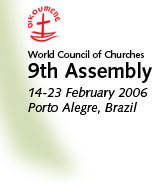 |
WCC > Home > Programme > Ecumenical conversations | ||||
| About the assembly | Programme | Theme & issues | News & media | |||||
 |
|
||||
|
Discussing and proposingA new element of the 9th Assembly programme was a series of "ecumenical conversations" designed to provide opportunities for sustained dialogue on significant issues. Delegates also gathered each day in smaller groups to get to know one another as well as to learn about and discuss issues of importance for the churches. Topics were grouped in broad areas, and participants in each group engaged with one another and developed ideas and proposals. Specific recommendations from these conversations were submitted to the Assembly's Programme Guidelines Committee, and provided background material for the work of the WCC's central committee. Introduction to the conversationsa. Changing religious and cultural contextIn a time of globalization, violence, ideological polarization, fragmentation and exclusion, what is the importance of Christian mission? This Ecumenical Conversation offered the opportunity to reflect on the message of the gospel and methods of mission in such a context. [More about this conversation] b. Changing ecclesial and ecumenical contextThe WCC's Common Understanding and Vision process offers a coherent and challenging vision: a broad fellowship of churches, committed and accountable to one another, seeking visible unity in their life and witness today. [More about this conversation] c. The changing international political, social and economic context From the prophet Isaiah to the pastor Bonhoeffer, from Esther in ancient Israel to the Mothers of Plaza de Mayo in Argentina of our day, prophets are real and inspiring. They are raised up in honour at regular intervals in the Bible. God's promise of a new heaven and a new earth owes something to their labors. Yet most believersno matter how committed to God's justicewould not call themselves prophets or think of themselves as prophetic people. [More about this conversation] d. Changing social and economic contextPoverty threatens life and human dignity. It is not a destiny, but the very result of the methods and structures of wealth creation and distribution of wealth in individual societies and worldwide. Inequality increases not by accident, but by the way economic and political processes are structured and function. Poverty undermines the very basis of life of billions of children, women and men who are denied not only the benefits of growing wealth, but even of access to basic necessities of life. [More about this conversation] |
|||
|
|
|


